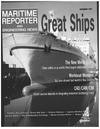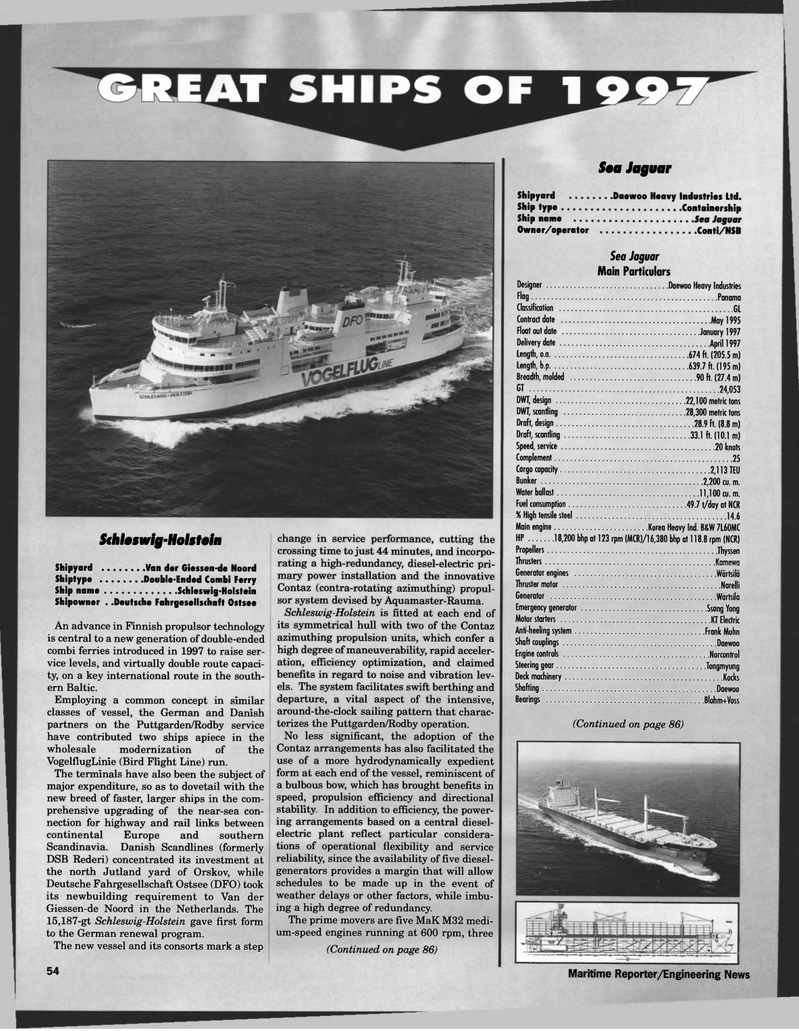
Page 55: of Maritime Reporter Magazine (December 1997)
Read this page in Pdf, Flash or Html5 edition of December 1997 Maritime Reporter Magazine
Schleswig-Holstein
Shipyard Van der Giessen-de Noord
Shiptype Double-Ended Combi Ferry
Ship name Schleswig-Holstein
Shipowner . .Deutsche Fahrgesells An advance in Finnish propulsor technology
is central to a new generation of double-ended
combi ferries introduced in 1997 to raise ser-
vice levels, and virtually double route capaci-
ty, on a key international route in the south-
ern Baltic.
Employing a common concept in similar
classes of vessel, the German and Danish
partners on the Puttgarden/Rodby service
have contributed two ships apiece in the
wholesale modernization of the
VogelflugLinie (Bird Flight Line) run.
The terminals have also been the subject of
major expenditure, so as to dovetail with the
new breed of faster, larger ships in the com-
prehensive upgrading of the near-sea con-
nection for highway and rail links between
continental Europe and southern
Scandinavia. Danish Scandlines (formerly
DSB Rederi) concentrated its investment at
the north Jutland yard of Orskov, while
Deutsche Fahrgesellschaft Ostsee (DFO) took
its newbuilding requirement to Van der
Giessen-de Noord in the Netherlands. The
15,187-gt Schleswig-Holstein gave first form
to the German renewal program.
The new vessel and its consorts mark a step
54
change in service performance, cutting the
crossing time to just 44 minutes, and incorpo-
rating a high-redundancy, diesel-electric pri-
mary power installation and the innovative
Contaz (contra-rotating azimuthing) propul-
sor system devised by Aquamaster-Rauma.
Schleswig-Holstein is fitted at each end of
its symmetrical hull with two of the Contaz
azimuthing propulsion units, which confer a
high degree of maneuverability, rapid acceler-
ation, efficiency optimization, and claimed
benefits in regard to noise and vibration lev-
els. The system facilitates swift berthing and
departure, a vital aspect of the intensive,
around-the-clock sailing pattern that charac-
terizes the Puttgarden/Rodby operation.
No less significant, the adoption of the
Contaz arrangements has also facilitated the
use of a more hydrodynamically expedient
form at each end of the vessel, reminiscent of
a bulbous bow, which has brought benefits in
speed, propulsion efficiency and directional
stability. In addition to efficiency, the power-
ing arrangements based on a central diesel-
electric plant reflect particular considera-
tions of operational flexibility and service
reliability, since the availability of five diesel-
generators provides a margin that will allow
schedules to be made up in the event of
weather delays or other factors, while imbu-
ing a high degree of redundancy.
The prime movers are five MaK M32 medi-
um-speed engines running at 600 rpm, three
(Continued on page 86)
Sea Jaguar
Shipyard Daewoo Heavy Industries Ltd.
Ship type Containership
Ship name Sea Jaguar
Owner/operator Conti/NSB
Sea Jaguar
Main Particulars
Designer Daewoo Heavy Industries
Flag Panama
Classification GL
Contract date May 1995
Float out date January 1997
Delivery date April 1997
Length, o.a 674 ft. (205.5 m)
Length, b.p 639.7 ft. (195 m)
Breadth, molded 90 ft. (27.4 m)
GT 24,053
DWT, design 22,100 metric tons
DWT, scantling 28,300 metric tons
Draft, design 28.9 ft. (8.8 m)
Draft, scantling 33.1 ft. (10.1 m)
Speed, service 20 knots
Complement 5
Cargo capacity 2,113 TEU
Bunker 2,200 cu. m.
Water ballast 11,100 cu.m.
Fuel consumption 49.7 t/day at NCR
% High tensile steel 14.6
Main engine Korea Heavy Ind. B&W 7L60MC
HP 18,200 bhp at 123 rpm (MCRJ/l 6,380 bhp at 118.8 rpm (NCR)
Propellers Thyssen
Thrusters Kamewa
Generator engines Wartsil
Thruster motor Narelli
Generator Wartsila
Emergency generator Ssang Yong
Motor starters KT Electric
Anti-heeling system Frank Mohn
Shaft couplings Daewoo
Engine controls Norcontrol
Steering gear Tongmyung
Deck machinery Kocks
Shafting Daewoo
Bearings Blohm+Vos
(Continued on page 86)
Maritime Reporter/Engineering News

 54
54

 56
56
